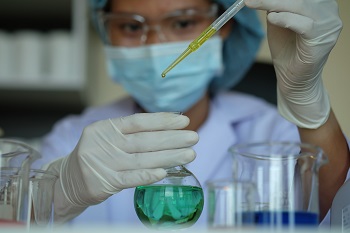Employers and Universities: Work with us?

How to become a scientist without going to uni
Are you interested in solving some of society’s big problems, like healthcare and disease? Want to use your scientific know-how to make a real difference? Are you passionate about what science can achieve? A career in science could be perfect for you.
You no longer need to go to university to become a scientist. You can do an apprenticeship instead. These are programmes that allow you to train on the job, gaining important transferable skills and working towards a qualification. You’ll also earn a salary.
In this guide we’ll look at science apprenticeships.
What are science apprenticeships?
Science apprenticeships allow you to become a scientist without going to university. In a lab setting, you’ll gain technical knowledge and key workplace skills. At the same time you’ll attend college or a training provider to study towards a qualification – you could even get a degree through your apprenticeship.
There are currently two types of science apprenticeships you can do (you’ll also see them referred to as biology apprenticeships): laboratory scientist and laboratory technician. We’ll look at each of them in turn.
1. Laboratory scientist

investigations.
You can train as a lab scientist by doing an apprenticeship. The scheme will last around five years.
What’s the job?
A lab scientist can work in different areas of science, including chemical, pharmaceutical, and nuclear. They gather data, interpret it, and then use that evidence to propose solutions to different problems.
After your apprenticeship the roles you’d be able to pursue include analytical chemist, research and development scientist, molecular biologist, microbiologist, and medicinal chemist.
What will I learn during my apprenticeship?
You’ll gain lots of scientific knowledge and technical skills during the programme, across analytical science, chemical science, research and development, and life sciences.
You’ll learn how to:
- Apply scientific principles to experiments in the lab.
- Carry out experiments based on instructions from your colleagues.
- Develop an in-depth knowledge in a particular area of science (known as your specialism).
- Stick to the rules of the company you’re working for.
- Stick to the rules and laws that cover confidentiality and keeping careful records.
- Work safely in a lab environment.
- Analyse and interpret scientific date.
- Present the findings of your experiments both in writing and verbally.
- Plan your tasks and prioritise different deadlines.
What skills will I gain?
During science or biology apprenticeships, you’ll develop the following skills:
- Communication: you’ll learn how to present your data to both a scientific and non-scientific audience. You’ll learn how to actively listen and adopt professional body language.
- Initiative: you’ll learn how to work on your own initiative.
- Teamwork: you’ll develop fantastic team-working abilities.
- Time management: you’ll learn how to manage your time like a pro.
- Adaptable: you’ll learn how to cope with change and be flexible when things don’t always go to plan.
- Problem solving: you’ll become a natural at solving problems and lateral thinking.
Is it right for me?
The exact nature of the apprenticeship will vary depending on which one you apply for, but we’ll take a look at some of the personal qualities you should have that would make you right for a science apprenticeship:
- Knack for communicating and making a convincing argument.
- Excellent people skills.
- Good numerical and IT skills.
- Great team player.
- Ambitious, dedicated, and enthusiastic.
- Good at multitasking.
- Trust-worthy and reliable.
- Strong attention to detail.
- Passion for science and keen to learn.
What qualifications will I gain?
The laboratory scientist apprenticeship is a level 5 degree apprenticeship (check this out for the different types), meaning when you complete it, you’ll have either a higher national diploma, foundation degree or even a full honours degree in a science.
You’ll also be recognised as a Registered Scientist (RSci) by professional bodies.
Am I eligible?
You will usually need 5 GCSEs at grade 4 or above in English and maths, and 3 A-levels (or equivalent). Two of those must be in a science subject.
But it’s important to check the entry requirements on the individual apprenticeship listing, which you can find using the government’s Find An Apprenticeship tool.
2. Laboratory technician
The laboratory technician apprenticeship is an advanced apprenticeship, and usually takes between 18 and 24 months.

team, making sure everything in the lab runs smoothly.
What’s the job?
Science lab technicians help scientists carry out investigations, measuring, recording and analysing different scientific data. They work in biology, chemistry, physics and the life sciences.
What will I learn during my apprenticeship?
You’ll learn how to:
- Work safely in the lab.
- Follow instructions and procedures.
- Prepare for different lab tasks using the right techniques and methods.
- Keep accurate records of experiments being carried out in the lab.
- Communicate scientific information appropriately.
What skills will I gain?
You’ll develop great communication, interpersonal, and team-working skills. You’ll be able to work with others as well as independently. You’ll develop adaptability skills.
Is it right for me?
Is the science lab technician apprenticeship for you? Have a look at a snapshot of the personal qualities and characteristics you need:
- Able to multitask and meet deadlines.
- Able to work as part of a team.
- Brilliant attention to detail.
- Very well organised and reliable.
- Willing to learn and gain new skills.
- Interested in science.
What qualifications will I gain?
You’ll work towards a level 3 or 4 qualification in science. The apprenticeship is recognised by professional bodies at Registered Science Technician (RSciTech) level.
Am I eligible?
To apply for a science lab technician apprenticeship, you’ll need at least 5 GCSEs including maths, English and Science at grade 4 or above. You may also need an A-level in a scientific subject – check the apprenticeship listing.
Image credits
Main image and lab scientist by photoroyalty via Freepik
